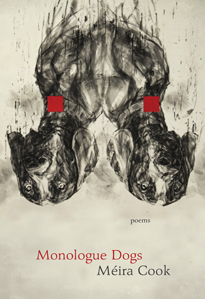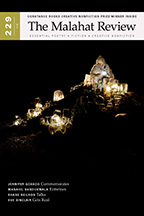Reviews
Poetry Review by Paul Franz
Méira Cook, Monologue Dogs (London: Brick, 2015). Paperbound, 75 pp., $20.00.
 Méira Cook’s fifth poetry collection, Monologue Dogs, is a strange and accomplished work, difficult to excerpt or gain purchase on in a brief discussion. Its major medium is surprise, but of middles more than endings; maybe one or two poems here relies heavily on a clinching final twist, and they are the less successful for it. More characteristic is a continually renewed surprise within and between sentences, where even the kind of twist—lexical or metaphorical, rhythmic or syntactic—can’t be predicted, as this passage from “Easing the Spring” illustrates:
Méira Cook’s fifth poetry collection, Monologue Dogs, is a strange and accomplished work, difficult to excerpt or gain purchase on in a brief discussion. Its major medium is surprise, but of middles more than endings; maybe one or two poems here relies heavily on a clinching final twist, and they are the less successful for it. More characteristic is a continually renewed surprise within and between sentences, where even the kind of twist—lexical or metaphorical, rhythmic or syntactic—can’t be predicted, as this passage from “Easing the Spring” illustrates:
Hello, knife! Good Morning, blade that cuts
the summer from the fall, the Fall
from what comes after pride, before gravity, beyond the parade
of mourning. That cuts the shade from the tree, the mother
from Persephone. And the cheap pomegranates
they sell at the Market? Windfall! Windfall!
This is particularly manic—maybe just this side of too-clever-by-half—but it also shows how Cook’s strangest detours can take us from wit to vision and back again. Far from the canned whimsy of too much contemporary poetry, Cook’s writing is not only funny, but seriously strange As her lines reel giddily between laughter, violence, grief, and desire, the reader is made to feel at once welcome and out of place, like a houseguest caught in the midst of a family dispute in a foreign language, unable to distinguish clearly between love and suppressed menace. Part of what encourages us to linger is sound; wordplay and assonance help bind these lines together, but so do rhythmical patterns that, without being strictly metered, clearly have pentameter lodged in their inner ear. These are, as the book’s title suggests, poems to read out loud.
In other respects, the book’s title is interestingly misleading. Setting aside the Dogs (itself characteristic in the way it seems generated, at least in part, by assonance with the word before it), Monologue implies the presentation of a distinct voice. To be sure, many poems here, like “The Devil’s Advocate,” or the savage and beautiful “Five Act Iscariot,” or “Here Am I” (this last spoken by the Abraham of Genesis, drawing on his words when called by God to sacrifice his son), fall into that category. Others, however, likewise named after figures from literature, history, or myth (for instance, “The Almost Boy,” about Pinocchio), are in the third person. Still others, like “Any Old Snake” (back to Genesis again) are technically in the first person, but so focused on their speakers’ outward perceptions—as opposed to, say, their inner lives, whatever a snake’s might be—that the name dwindles to a mere topic, a way of setting the scene. But when, as often, the outward trappings aren’t what we’d expect from the traditional story (“Young Eve,” in the Garden of Eden sequence just mentioned, loses her virginity after driving “north along the highway with my boyfriend / in his daddy’s pickup”), the titles reveal their true nature as archetypes, resonating curiously with the poem we read, and offering a clue for its interpretation.
Cook’s reliance on such archetypes is fitting in a book largely focused on relationships between parents and children. So is the eerie porousness between her protagonists’ identities, suggestive of the way in which being a relative is just that: one person’s mother is another’s daughter, is another’s sister, and on and on. A phrase uttered by a mother in one poem is, accordingly, picked up and varied by the Queen of Portugal in another, or by the implicit narrator of yet another, before a complex adage braids the strands together: “My mother / devotes herself to virtuous translations: for rivers, / stone into silt; for spiders, saliva into silk. For mothers, / Nothing To Be Done into hurry, into spilt, into milk” (“Easing the Spring”). If Cook’s characters and allusions help locate her work within broader poetic and literary traditions, such internal resonances give it its own special density, its identity.
Classically, the gift for metaphor is the rarest; for Aristotle it was the one poetic talent that could not be taught. For some poets, however, able to leap with apparent ease from image to image, concept to concept, practising it may mean learning to do so less frequently but more decisively. Cook has clearly decided otherwise; the prudent husbanding of effects evidently seemed a paltry substitute for abundance—an abundance that, as this stanza from a pastoral eclogue on Hansel and Gretel shows, she can find as readily in a wintry scene as any other: “The days ring with frost, the days / arranged like a table setting of thin-stemmed / wine glasses, each one filled to a different level. / We run up and down the length of days, / ringing at their rims till they sing” (“The Hunger Artists”). With their sharp wit and imagination, their learning and genuine humour, these Monologue Dogs are worth not only reading but, more importantly, rereading.
—Paul Franz









